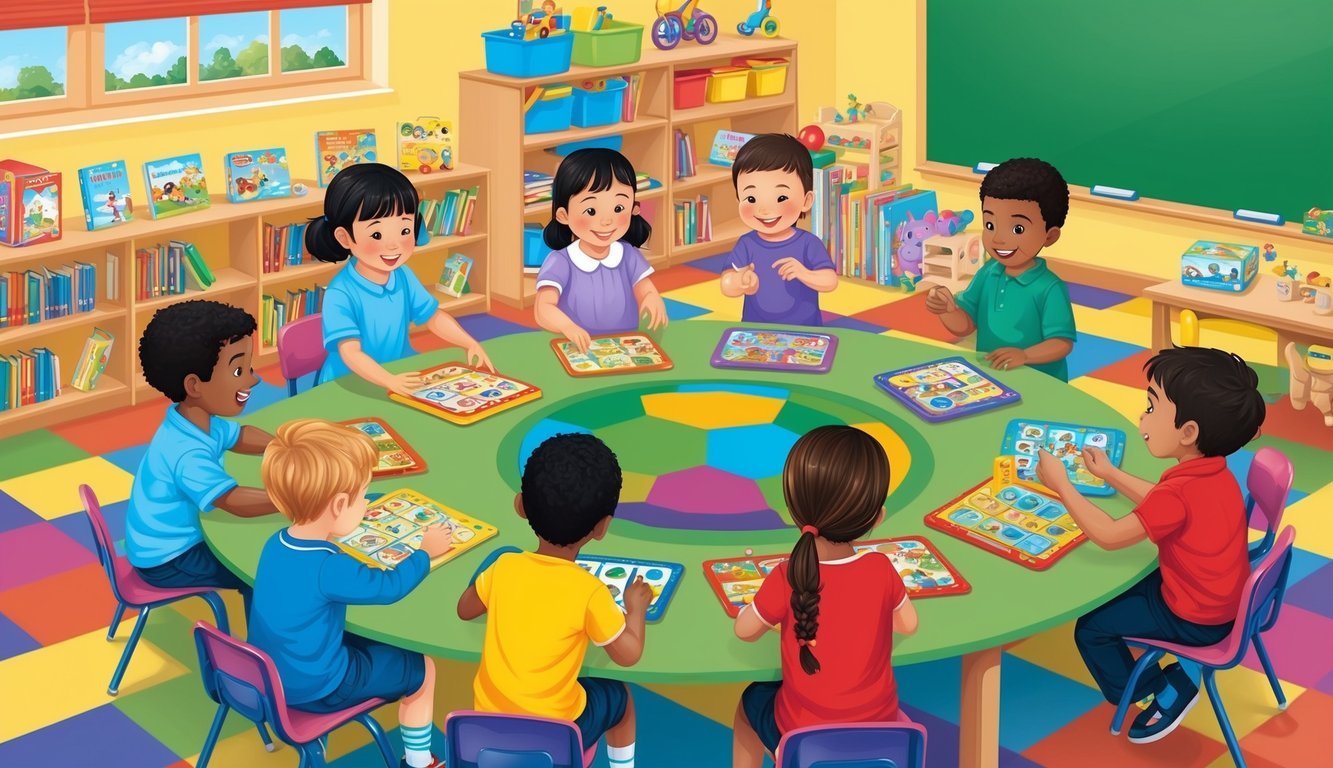Educational children’s games have come a long way in recent years.
You might remember the clunky educational software of the past, but today’s options are engaging, interactive, and actually fun to play.
From math puzzles to reading adventures, there’s something for every young learner.
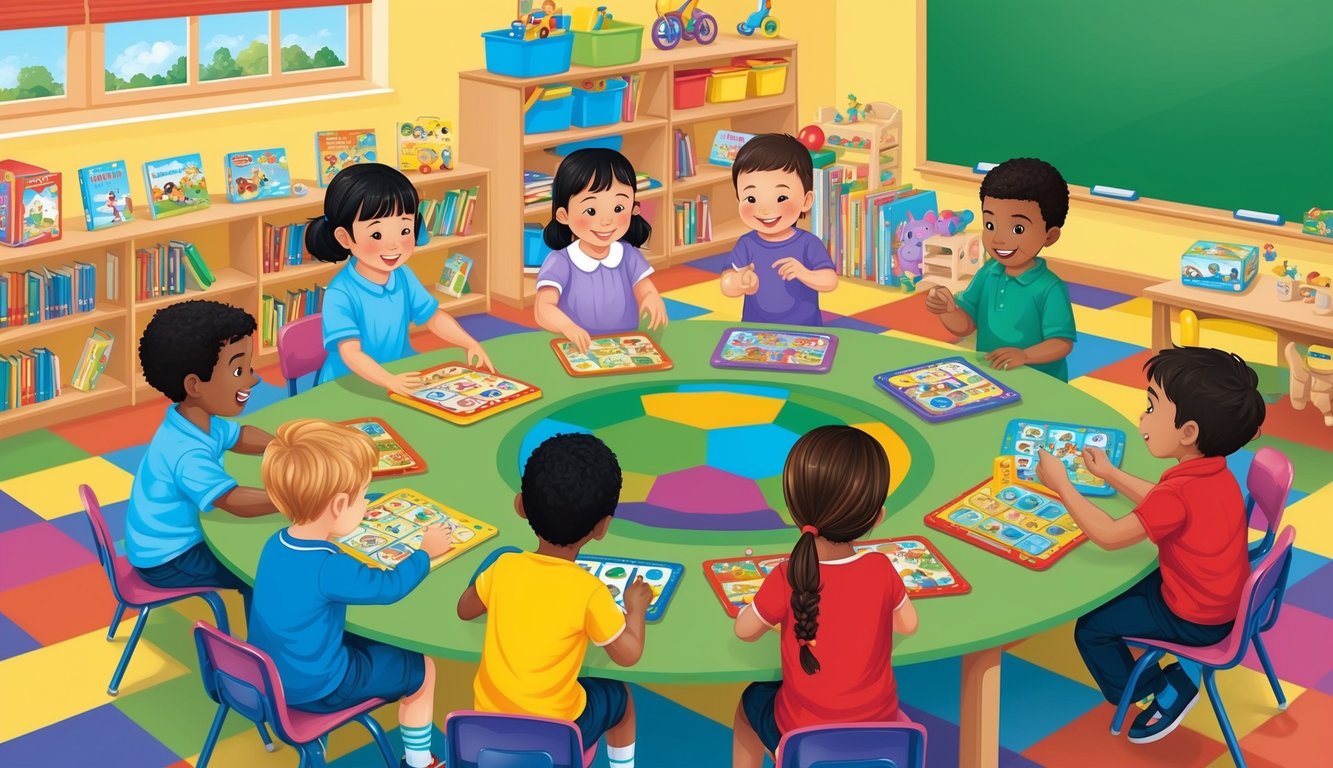
These games aren’t just about entertainment – they’re powerful learning tools.
Educational games can help kids build essential skills in subjects like math, reading, and science while having a blast.
You’ll find options for all ages, from preschoolers just starting to learn their ABCs to older kids tackling more complex topics.
Many of these games are available online or as apps, making them easy to access anytime.
Some popular platforms like PBS KIDS and ABCya! offer a wide variety of educational games covering different subjects and skills.
Whether you’re a parent looking to supplement your child’s learning or a teacher searching for engaging classroom activities, educational games can be a valuable resource.
Understanding Educational Games
Educational games blend learning and fun, making complex topics easier for kids to grasp.
They offer a unique way to engage young minds while teaching important skills and concepts.
Benefits of Learning Through Play
Playing educational games helps kids retain information better.
When you’re having fun, your brain is more receptive to new ideas.
These games can boost problem-solving skills and critical thinking.
They often require you to apply knowledge in creative ways.
Interactive games can improve hand-eye coordination and fine motor skills.
Many online educational games adapt to your child’s level, providing just the right challenge.
This personalized approach keeps kids motivated and confident.
Learning through play also encourages social skills.
Multiplayer games teach teamwork and communication.
Even single-player games can spark discussions about what was learned.
Types of Educational Games
You’ll find a wide variety of educational games for kids.
Some focus on specific subjects like math or reading.
Others take a broader approach, teaching general knowledge or life skills.
Free educational games are available online, offering budget-friendly options.
Many are designed for tablets or smartphones, making learning possible anywhere.
Popular types include:
- Puzzle games (improve logical thinking)
- Simulation games (teach real-world concepts)
- Quiz games (reinforce factual knowledge)
- Adventure games (encourage exploration and problem-solving)
Learning games often incorporate storytelling to make lessons more engaging.
This narrative approach helps kids connect emotionally with the material.
Some games use augmented reality, blending digital elements with the real world.
These can make abstract concepts more tangible and exciting for young learners.
Literacy and Language Arts
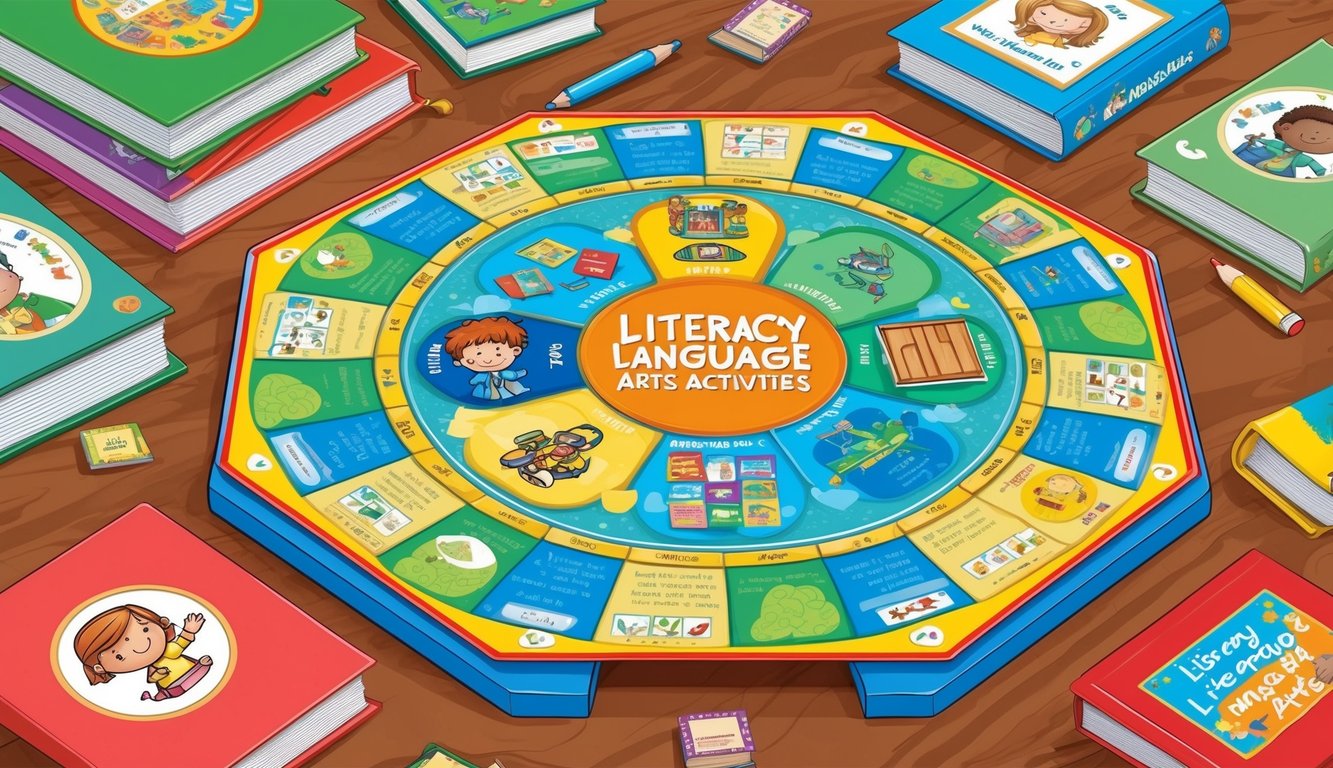
Educational games focused on literacy and language arts help kids develop crucial communication skills.
These interactive activities make learning fun while building a strong foundation in reading, writing, and language.
Letter Recognition Games
Alphabet-themed games introduce young learners to letters in engaging ways.
You can find colorful apps and websites featuring animated characters that guide kids through letter identification exercises.
Many use catchy songs or rhymes to help the alphabet stick.
Interactive activities often ask you to match uppercase and lowercase letters or find specific letters hidden in scenes.
Some games challenge you to trace letter shapes with your finger or mouse, reinforcing proper formation.
As skills progress, letter games may incorporate basic phonics, teaching the sounds each letter makes.
This prepares kids for reading simple words.
ELA Games for Reading and Writing
Reading games often use short stories or passages with comprehension questions to check understanding.
You might encounter multiple-choice quizzes, fill-in-the-blank exercises, or drag-and-drop activities to demonstrate reading skills.
Writing games can take many forms.
Some focus on grammar, asking you to identify parts of speech or correct sentence errors.
Others encourage creative writing through story prompts or word banks to spark ideas.
Many ELA games blend reading and writing practice.
You might read a paragraph, then write a summary or answer questions in complete sentences.
Rhyming and Phonics Adventures
Rhyming games help you recognize similar word sounds, a key skill for early readers.
You may be asked to match rhyming picture pairs or complete sentences with rhyming words.
Phonics games teach letter-sound relationships.
You might sort words by their beginning sounds or build words by combining letter sounds.
Some games use silly characters or storylines to make learning phonics rules more memorable.
As your skills improve, phonics games introduce more complex concepts like blends and digraphs.
You’ll practice sounding out longer words and recognizing common spelling patterns.
Mathematics Mastery
Math games help kids build essential skills while having fun.
These engaging activities cover a wide range of concepts, from basic number recognition to complex problem-solving.
Early Math Concepts
Number recognition forms the foundation of math skills.
Interactive games introduce young learners to counting, addition, and subtraction through colorful visuals and simple challenges.
You’ll find apps and online platforms that use cute characters to guide children through basic math operations.
These games often incorporate rewards and progress tracking to keep kids motivated.
Money-themed games teach practical math skills.
They help you understand currency values and practice making change, blending math with real-world applications.
Advanced Math Games
As math skills progress, games become more complex.
Multiplication and division games often use timed challenges to improve speed and accuracy.
You’ll encounter fraction games that visualize concepts through pizza slices or pie charts.
These make abstract ideas more concrete and easier to grasp.
Geometry games introduce shapes, angles, and spatial reasoning.
They might ask you to rotate objects or solve puzzles using geometric principles.
Decimal games often use number lines or grids to help you understand place value and compare decimal amounts.
Mathematics With Multimedia
Video-based math lessons combine entertainment with education.
You’ll find animated explanations of complex topics like algebra or trigonometry.
Interactive whiteboards let you manipulate numbers and shapes on-screen.
This hands-on approach helps reinforce concepts as you learn.
Virtual reality games immerse you in 3D environments where math problems come to life.
You might solve equations to escape a maze or use geometry to build structures.
Music-based math games use catchy tunes to help you remember times tables and formulas.
The rhythm and repetition aid in memorization and recall.
Exploring Science and Nature
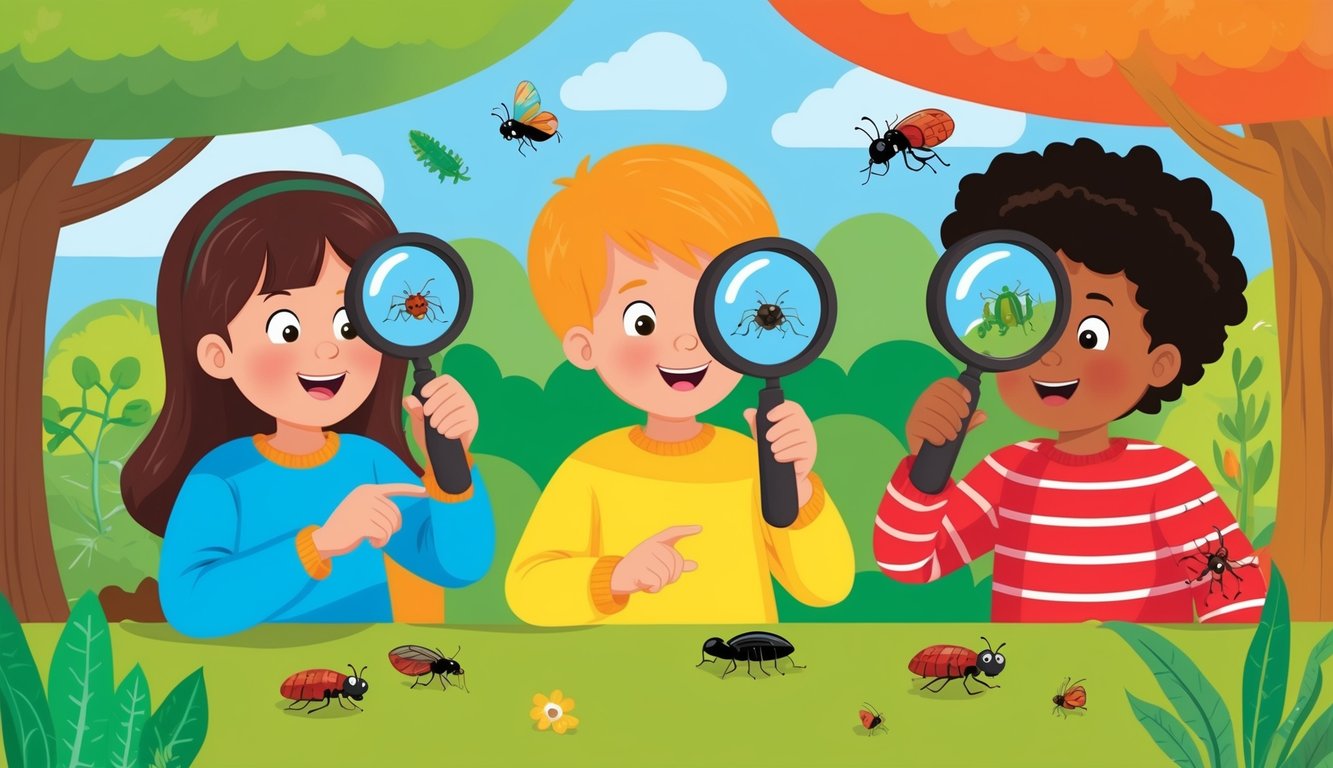
Science and nature games offer kids exciting ways to learn about the world around them.
These interactive experiences spark curiosity and encourage hands-on discovery of scientific concepts and natural phenomena.
Environmental Discovery Games
Grab your virtual magnifying glass and explore the great outdoors! Nature-themed games let you observe animals, plants, and ecosystems up close.
Snap photos of wildlife in different seasons or help balance delicate ecosystems.
You can even make mud pies for some messy fun that doubles as a sensory activity.
These games teach you about habitats, food chains, and how living things interact with their environment.
Try building your own nature scenes or solving puzzles featuring your favorite animals.
You’ll learn to identify different species and understand how they adapt to their surroundings.
Space Exploration Activities
Blast off into the cosmos with space-themed games that are out of this world! Build and launch rockets, explore distant planets, or navigate through asteroid fields.
These activities introduce basic concepts of astronomy and physics in an engaging way.
You can design your own space station, grow plants in simulated alien environments, or collect space rocks.
Some games even let you drive Mars rovers or conduct experiments on the International Space Station.
As you play, you’ll learn about gravity, orbits, and the vastness of the universe.
Space games often include fun facts about real NASA missions and discoveries to fuel your curiosity.
Interactive Science Labs
Put on your lab coat and dive into virtual experiments! These games turn your device into a science lab where you can mix chemicals, build circuits, or dissect virtual specimens.
You’ll learn the scientific method as you form hypotheses and test them through trial and error.
Try engineering challenges like building bridges or designing earthquake-proof structures.
Or conduct classic experiments like the egg drop, where you create a container to protect an egg from a long fall.
Many of these games feature step-by-step instructions and safety tips, just like a real lab.
You’ll gain hands-on experience with scientific tools and procedures while having fun.
Social Studies and Geography
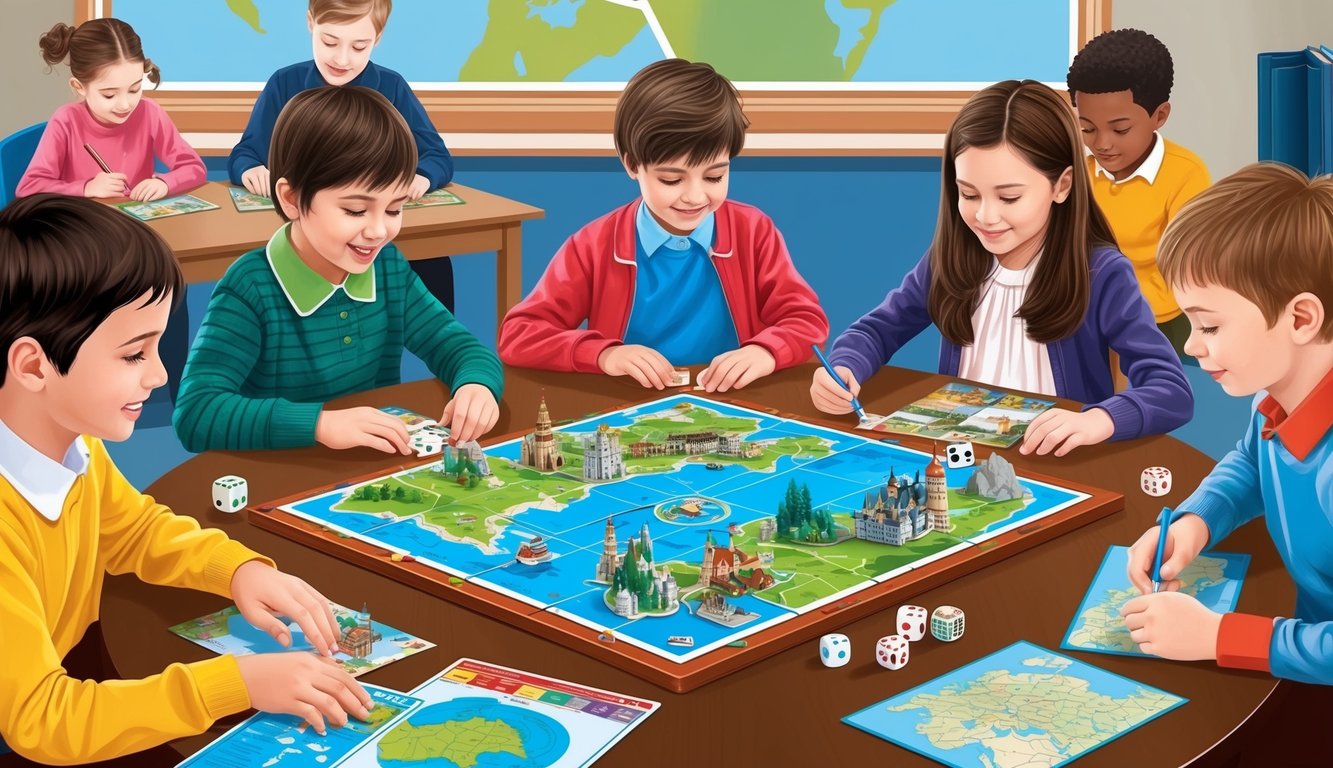
Educational games focused on social studies and geography introduce kids to diverse cultures, historical events, and global awareness.
These games make learning about our world fun and engaging.
Cultural Immersive Games
Step into the shoes of people from different cultures with immersive games.
You can explore traditional customs, try virtual cooking experiences, or learn about clothing styles from around the globe.
These games often include interactive maps where you can click on countries to discover fascinating facts.
Some games challenge you to match cultural artifacts to their regions of origin.
Others let you design your own virtual museum exhibits showcasing different cultures.
Role-playing games are particularly effective for cultural learning.
You might take on the role of a shopkeeper in an ancient Mayan marketplace or a trader along the Silk Road.
Historical Time Travels
Travel back in time with games that bring history to life.
You can build ancient civilizations, solve mysteries from the past, or participate in historical events.
Strategy games often focus on important periods like the American Revolution or World War II.
You’ll make decisions that could change the course of history.
Puzzle-based games might have you decoding hieroglyphics or piecing together archaeological finds.
These games sharpen your problem-solving skills while teaching historical facts.
Some games use a “choose your own adventure” format.
You’ll face historical dilemmas and see how your choices impact the outcome.
Global Awareness
Expand your worldview with games that promote global awareness.
Many of these focus on current events and global issues.
Geography quiz games test your knowledge of countries, capitals, and landmarks.
Some use timed challenges to add excitement.
You can play as a virtual journalist, traveling the world to report on different cultures and environmental issues.
These games often include real-world photos and videos.
Eco-focused games let you manage resources and tackle climate change scenarios.
You’ll learn about sustainability while having fun.
Some games simulate international trade or diplomacy.
You’ll negotiate deals and learn about global economics in the process.
Creative Expression and Art
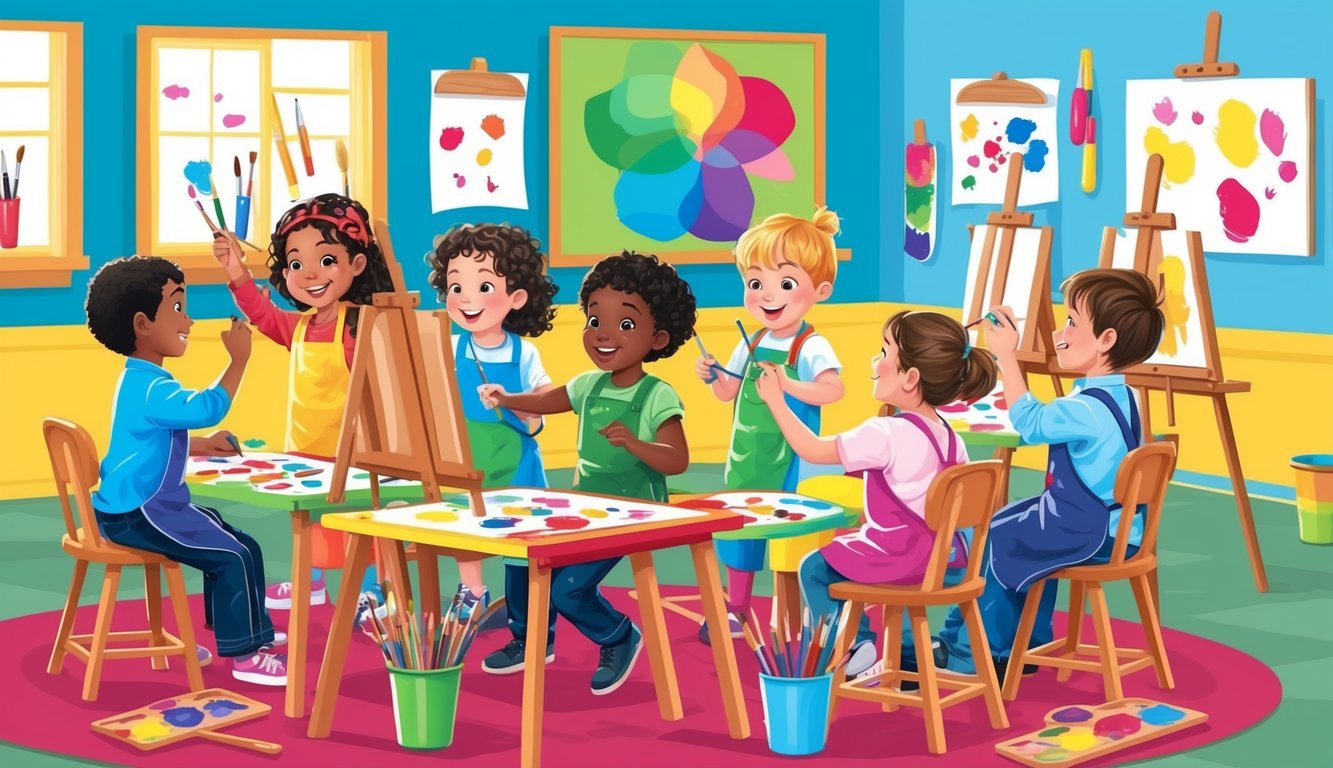
Art games and activities foster imagination and self-expression in children.
You can engage kids in various creative pursuits that build confidence and develop artistic skills.
Music Rhythm Fun
Get your kids grooving with music-based games that teach rhythm and melody.
Try “Musical Statues” where kids dance and freeze when the music stops.
This classic game improves listening skills and body control.
For a hands-on activity, make DIY instruments using household items.
Craft shakers from plastic bottles filled with beans or rice.
Build a guitar from a tissue box and rubber bands.
Host a family karaoke night to encourage singing and performance.
Choose kid-friendly songs and take turns belting out tunes together.
This boosts confidence and vocal abilities.
Digital Art Creations
Explore digital art tools designed for young artists.
Try Paint Online, a free app that offers various brushes and colors for digital drawing.
It’s perfect for ages 6-13 and works on tablets or computers.
Introduce photo editing basics with kid-safe apps.
Let children add fun stickers or filters to family photos.
This teaches visual creativity and basic tech skills.
Create animated stories using simple animation software.
Kids can draw characters and backgrounds, then bring them to life with movement.
This combines storytelling with visual art.
Storytelling and Drama
Spark imagination through storytelling games.
Play “Story in a Bag” by putting random objects in a bag.
Then, take turns pulling items out and weaving them into a tale.
This improves narrative skills and creativity.
Set up a puppet theater using a cardboard box.
Help kids create finger puppets or sock puppets.
Then, let them act out favorite stories or invent new ones.
Try “Emotion Charades” to explore dramatic expression.
Write emotions on slips of paper and have kids act them out without words.
This builds empathy and non-verbal communication skills.
Puzzle and Strategy Games
Puzzle and strategy games offer exciting ways to challenge your mind and have fun.
These games help develop critical thinking, pattern recognition, and memory skills while providing entertainment.
Critical Thinking Challenges
Plumber is a popular puzzle game that tests your problem-solving abilities.
You’ll need to think ahead as you build pipes to direct water flow before time runs out.
This game sharpens your planning and spatial reasoning skills.
Tower defense games are another great option for boosting strategic thinking.
You’ll place defensive structures to stop waves of enemies, requiring careful resource management and foresight.
Chess and checkers are classic strategy games that never go out of style.
These timeless favorites teach you to anticipate your opponent’s moves and plan multiple steps ahead.
Pattern Recognition Games
Match-3 games are addictive puzzlers that improve your ability to spot patterns.
You’ll swap colorful tiles to create matches, often against the clock or with limited moves.
Mahjong solitaire challenges you to find matching pairs of tiles.
This game enhances your visual perception and helps you develop strategies for uncovering hidden matches.
Tetris-style games test your spatial awareness as you rotate and place falling shapes.
Quick thinking and the ability to recognize optimal placements are key to success.
Memory Strengthening Puzzles
Memory matching games are simple yet effective for improving recall.
You’ll flip cards to find pairs, training your brain to remember positions and images.
Crosswords and word searches expand your vocabulary while exercising your memory.
You’ll need to recall spellings and definitions as you solve clues or hunt for hidden words.
Jigsaw puzzles, whether digital or physical, challenge your visual memory.
You’ll need to remember piece shapes and image details to complete the picture.
Fostering Healthy Habits
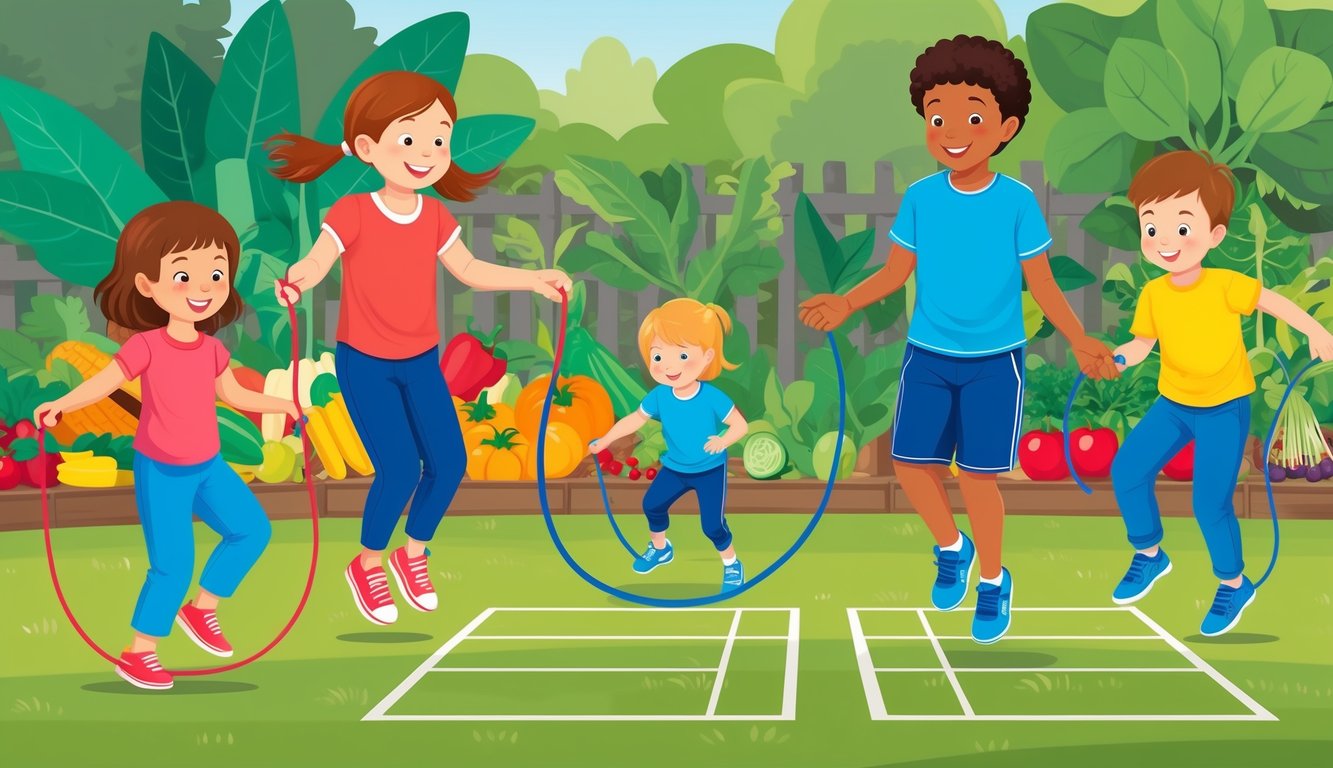
Games can make learning about nutrition and wellness fun for kids.
Interactive activities teach children to make smart choices for their bodies and minds.
Nutrition and Food Games
“Healthy Plate Match-Up” lets you create balanced meals using puzzle pieces representing food groups.
Place proteins, grains, fruits, and veggies on an illustrated plate to learn proper portions. “Curious Chefs” gets you cooking with your family, demystifying the kitchen and encouraging healthy eating habits.
Try “Nutri-Quest,” a treasure hunt where you search for clues about nutrition.
It’s an exciting way to discover new foods and their benefits.
Food relay races are another active option – form teams and take turns grabbing food models to build nutritious meals.
Wellness and Mindfulness Interactives
“Super Sleep Routines” helps you develop better bedtime habits through fun challenges.
You might track your sleep for a week or design the perfect relaxing bedroom.
Good sleep is crucial for focus and growth.
Mindfulness games teach you to manage stress and emotions.
Try “Breathing Buddies” where you place a small toy on your belly and watch it rise and fall as you take deep breaths.
This simple exercise helps calm your mind and body.
Plant a mini garden to learn about where food comes from.
Watching seeds grow into vegetables connects you to nature and encourages trying new, healthy foods.
Technology and Typing Skills
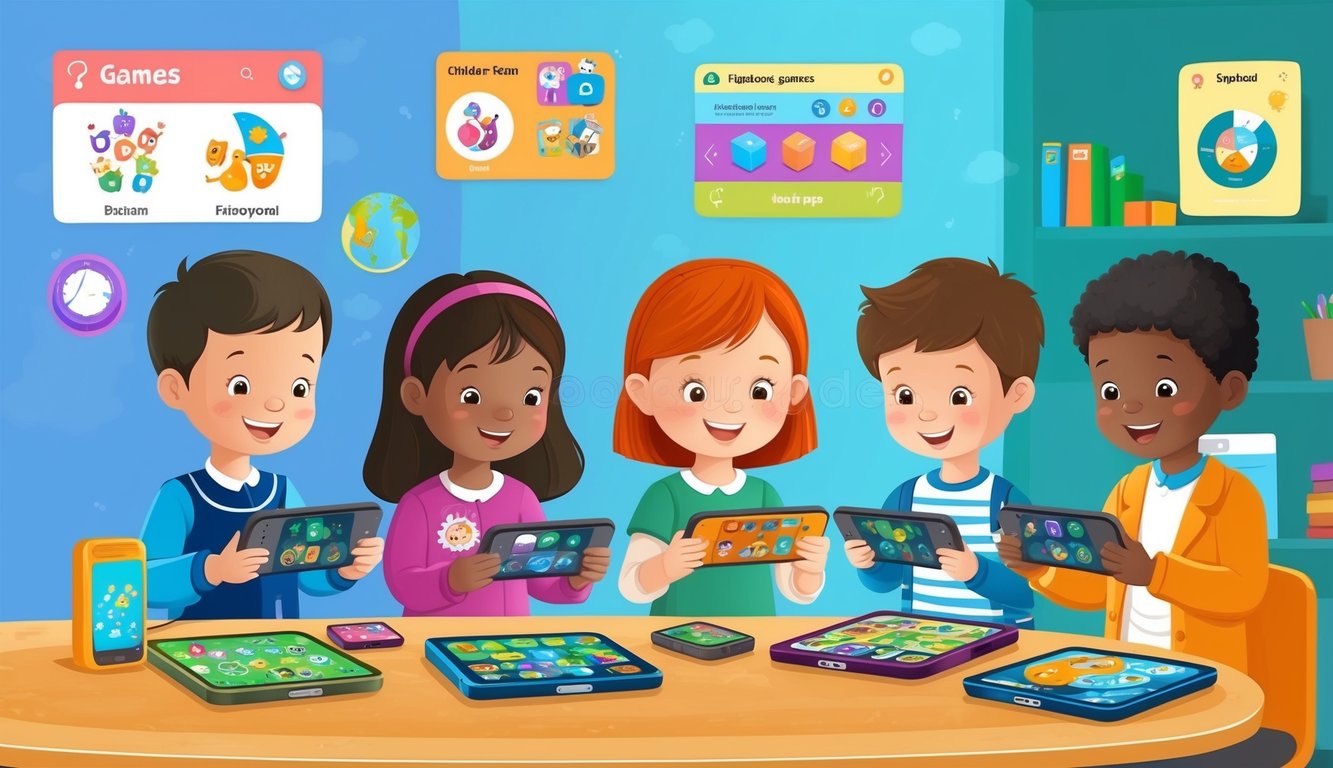
Digital skills are essential for today’s kids.
Games make learning these skills fun and engaging, helping children prepare for a tech-driven world.
Tech-Savvy Learning Games
Interactive games introduce kids to technology in an approachable way.
You’ll find apps and websites offering colorful puzzles, quizzes, and challenges that teach basic computer skills.
These games often feature animated characters guiding children through tasks like mouse control, keyboard familiarity, and simple programming concepts.
Many tech learning games adapt to your child’s skill level, providing just the right amount of challenge.
As kids progress, they unlock new levels and earn rewards, keeping them motivated to continue learning.
Typing Games for Digital Literacy
Typing games transform keyboard practice into an exciting adventure.
You’ll see kids eagerly tapping away as they race against the clock or compete with friends.
These games often disguise typing drills as fun missions or stories.
Popular typing games include:
- Zombie-themed challenges where fast typing defeats monsters
- Space adventures requiring quick keystrokes to navigate obstacles
- Word games that improve both typing speed and vocabulary
As children play, they naturally develop proper finger placement and increase their typing speed.
Many games provide instant feedback, helping kids track their progress in words per minute and accuracy.
PBS Kids Game Spotlight
PBS Kids offers a treasure trove of engaging games featuring beloved characters.
These educational adventures blend fun with learning, helping kids develop important skills through play.
Exploring PBS Kids Favorites
You’ll find a wide variety of games on PBS Kids featuring popular characters.
Donkey Hodie’s “Go Fetch With Bob Dog” challenges players to sort toys using classification and visual skills.
It’s a claw machine-style game that sharpens flexible thinking.
Curious George and Odd Squad also make appearances in fun, interactive experiences.
These games often focus on subjects like math, science, and problem-solving.
For creative play, check out Rosie’s Slime Shop.
You’ll get to make colorful slime for customers, mixing ingredients and experimenting with textures.
Educational Adventures with Wild Kratts
Wild Kratts games take you on exciting nature expeditions.
You’ll learn about animals and their habitats while having a blast with the Kratt brothers.
These games often involve animal rescue missions or exploration of different ecosystems.
You might help endangered species, discover new creatures, or solve environmental challenges.
Wild Kratts adventures teach biology, ecology, and conservation in an engaging way.
You’ll pick up fascinating animal facts while developing critical thinking skills.
Learning with Daniel Tiger
Daniel Tiger’s Neighborhood games focus on social-emotional learning and life skills.
You’ll join Daniel and his friends in activities that teach valuable lessons.
These games often cover topics like sharing, dealing with emotions, and trying new things.
You might help Daniel get ready for school or learn about different jobs in the neighborhood.
Through colorful, interactive play, you’ll develop empathy, self-confidence, and problem-solving abilities.
Daniel Tiger’s games are perfect for younger children, offering gentle guidance in navigating everyday situations.
New and Popular Game Releases
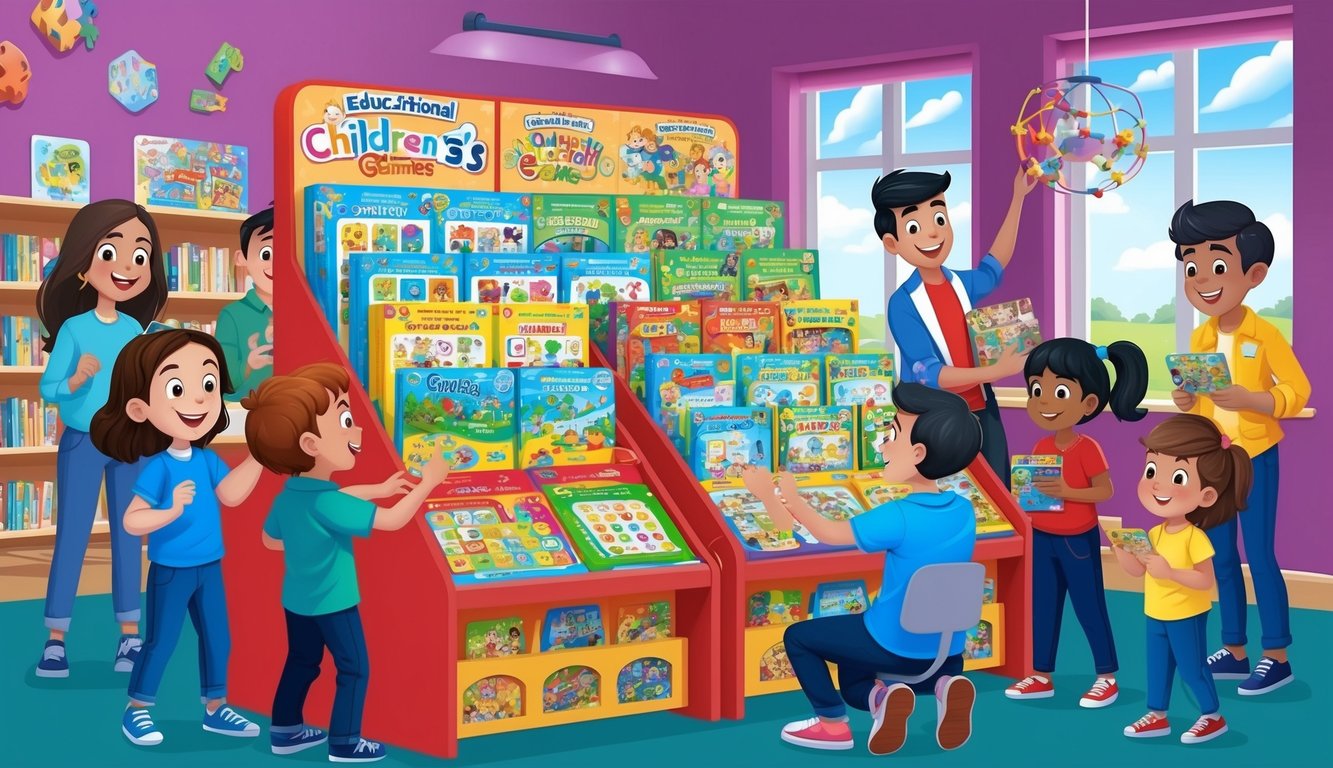
Are you looking to spice up your kid’s gaming collection? You’re in luck! Some exciting new educational games have hit the market recently.
“Little Big Planet 3” introduces three fun characters: Toggle, Swoop, and Oddsock.
You can enjoy this creative platformer on PlayStation consoles.
For younger learners, check out ABCmouse.
This app offers thousands of activities to help with reading and counting.
You can try it free for 30 days before deciding on a subscription.
Want a classic board game with a twist? “Taco Cat Goat Cheese Pizza” is gaining popularity.
It’s a fast-paced card game that’ll have the whole family laughing.
For a mess-friendly option, “Yeti in My Spaghetti” is a hit.
Players take turns removing noodles without letting the yeti fall.
It’s simple, silly, and perfect for preschoolers.

